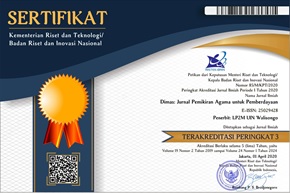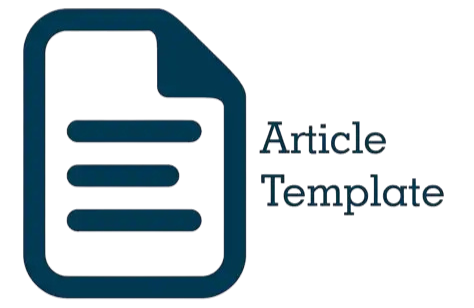Pembuatan Buku Ajar Hadis Tarbawi Sebagai Usaha Peningkatan Pemahaman Hadis-Hadis Pendidikan Bagi Mahasiswa
DOI:
https://doi.org/10.21580/dms.2020.202.5418Keywords:
Textbooks, Tarbawi Hadith, StudentsAbstract
The main problem faced by many Islamic higher education students in Tarbawi hadith courses is the lack of understanding of references in Arabic classical books (al-Turats al-Islamiyyah). Meanwhile, in the course, the knowledge of the intended knowledge is needed. In hindsight, until now there has been no textbook that specifically uses the easiest method of understanding Tarbawi Hadith. This service aims to make textbooks and student assistance in understanding the educational traditions of the classical books. The method used in this assistance is participatory action research with the use of lidwa library software or the book of nine priests. The results of this service show that there are significant changes in knowledge before and after using Tarbawi hadith textbooks.
Masalah utama yang banyak dihadapi mahasiswa perguruan tinggi agama Islam, pada mata kuliah hadis tarbawi yaitu kurangnya pemahaman akan referensi kitab-kitab klasik berbahasa arab (al-Turats al-Islamiyyah). Sementara itu, pada mata kuliah tersebut pengetahuan ilmu dimaksud sangat dibutuhkan. Jika dilihat kebelakang, hingga saat ini belum terdapat buku ajar yang secara khusus menggunakan metode termudah dalam memahami hadis tarbawi. Pengabdian ini bertujuan melakukan pembuatan buku ajar dan pendampingan mahasiswa dalam memahami hadis-hadis pendidikan dari kitab-kitab klasik. Metode yang digunakan dalam pendampingan ini yaitu participatory action research dengan pemanfaatan software lidwa pustaka atau kitab sembilan imam. Hasil dari pengabdian ini menunjukkan terdapat perubahan pengetahuan yang signifikan sebelum dan sesudah menggunakan buku ajar hadis tarbawi.
Downloads
References
Al-Sijistani, A. D. 2011. Sunan Abi Dawud. Libanon: Dar al-Kutub al-Ilmiyyah.
Dikti. 2019. Pedoman Operasional Penilaian Angka Kredit Kenaikan Jabatan Akademik/Pangkat Dosen. Direktorat Jenderal Sumber Daya Iptek Dan Dikti Kementerian Riset, Teknologi Dan Pendidikan Tinggi.
Fahmi, M. 2019. Sistem Informasi Akademik. Retrieved from http://siak.iaingorontalo.ac.id/
Khon, A. M. 2014. Takhrij & Metode Memahami Hadis. Jakarta: AMZAH.
Matsun, D. 2019. "Pelatihan dan Pendampingan Pembuatan Buku Ajar Untuk Guru Fisika Kalimantan Barat". Jurnal Pengabdian Sriwijaya, 7(4), 864–868. Retrieved from jurnal.umk.ac.id/index.php/RE/article/view/600
Nusrotus Sa’idah. 2016. "Pengembangan Buku Ajar Statistik Sebagai Penunjang Perkuliahan". Jurnal Ilmiah Kependidikan, 6(2), 103–111. https://doi.org/10.24176/re.v6i2.600
Sumbullah, U. 2012. Kritik Hadis; Pendekatan Historis Metodologis. Yogyakarta: SUKSES Offset.
Sunarto, M. J. D. 2017. "Penerapan Pendekatan Participation Action Research dalam Pembuatan Aplikasi Pembelajaran “MOLEARN” Bagi MGMP SMA Jawa Timur". In Prosiding Konferensi Nasional Guru dan Inovasi Pendidikan (pp. 1–12). Bali.
Sutikno. 2017. "Kompetensi Keagamaan Mahasiswa Prodi PAI Fakultas Tarbiyah Dan Keguruan UIN Sunan Ampel Surabaya (Analisis Perbandingan Penerimaan Jalur SPAN, UM PTKIN dan Jalur Mandiri Tahun 2016)". Jurnal Pendidikan Agama Islam (Journal of Islamic Education Studies), 5(2), 244–263. http://dx.doi.org/10.15642/jpai.2017.5.2.244-263
Umar, B. 2012. Hadis Tarbawi; Pendidikan dalam Perspektif Hadis. Jakarta: AMZAH.
Downloads
Published
Issue
Section
License
Copyright
The copyright of the received article shall be assigned to the journal as the publisher of the journal. The intended copyright includes the right to publish the article in various forms (including reprints). The journal maintains the publishing rights to the published articles. Therefore, the author must submit a statement of the Copyright Transfer Agreement.*)
Licensing

This work is licensed under a Creative Commons Attribution-ShareAlike 4.0 International License.
In line with the license, authors are allowed to share and adapt the material. In addition, the material must be given appropriate credit, provided with a link to the license, and indicated if changes were made. If authors remix, transform or build upon the material, authors must distribute their contributions under the same license as the original.
_______
*) Authors whose articles are accepted for publication will receive confirmation via email and send a Copyright Transfer Agreement.









